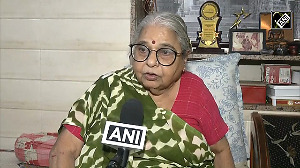It has been a busy morning for the markets, because the news broke early in the morning that Tatas have snapped up Corus for 608 pence/share, valuing it at more than $11 billion.
But what does this mean for their balancesheet in the near term and what could it mean in terms of a strategic benefit going forward for the long-term? J Mehra of the Essar Group shares his perspective.
Excerpts from CNBC-TV18's exclusive interview with J Mehra:
Candidly, 608 - is it a high price or is it okay?
I think it is just a little over what one would have expected it to end at. But considering the advantages that they were getting in terms of acquisition over a longer period of time, it should be okay.
Would you have paid this price, if you were in their shoes?
If you had the kind of money that the Tatas are able to muster, I think this is a good deal because after this you do not have many more deals of this kind available. If one has to be a global player, these are the risks involved and I think that the point about the pricing cycle has been talked about.
There is volatility in steel pricing, but the consolidation is a step towards controlling that volatility. And I think that this consolidation is a process, which will bring some stability in the pricing and if this happens, I think this deal may look as overpriced at this point in time, may really pull off in the long run.
Are there any ramifications or takeaways for the Indian steel industry because of this move?
For the industry as a whole, such consolidations will bring stability in the pricing. Seel has been a victim of a very high volatility in the prices in the past. I think that once this process gets completed and moves on, it will bring stability and that is actually good for the Indian steel industry.
A lot of steel companies in the past have taken big balancesheet bets at reasonably close to the peaks of the steel cycle and are paid very badly or very dearly for it. Do you fear this could be one mode of these moves?
If I become a very captive, yes, I would agree with you. But I think that things have changed in the recent past compared to what they were a few years ago. Consolidation today has led to price stability. You have seen that last year; European prices fell and they were controlled by the manufacturers by cutting their capacities because they were fewer numbers who could come around and cut the capacity to hold the pricing. So this does give a certain amount of a difference to what it was a few years ago.
How do you see the market for steel prices shaping up for the rest of this year? Do you expect them to stabilize or do you expect to see an uptake as well?
I would expect that the way the economy is doing all over the world and the way the Asian markets are behaving, prices will remain stable and they may see an upward trend. But one thing as a matter of judgement on the Tata's deal one should take a view as to what we talked all about when Mittal took over Arcelor.
It was considered as a very big deal and in a big proportion there were doubts at this, he has proved all of us wrong. All the deals whichever takes place we always have a skepticism but we should appreciate that the Tatas have been in the business over 100 years, they would not make a mistake in correctly assessing the potentials.
The Tata-Corus Saga: Complete Coverage
For more such reports, log on to www.moneycontrol.com





